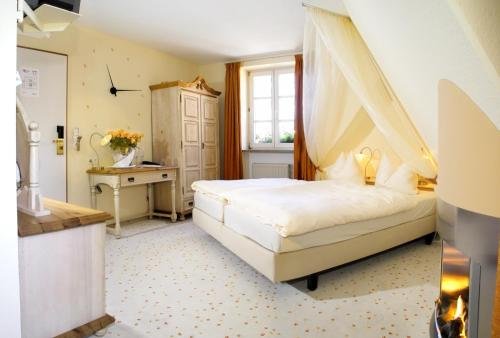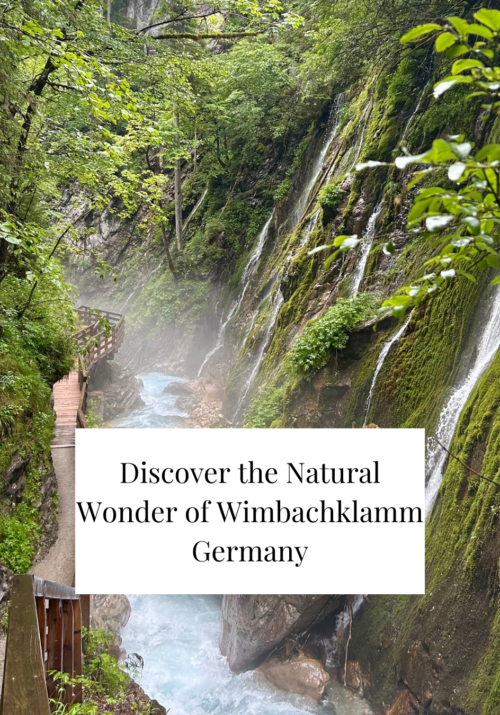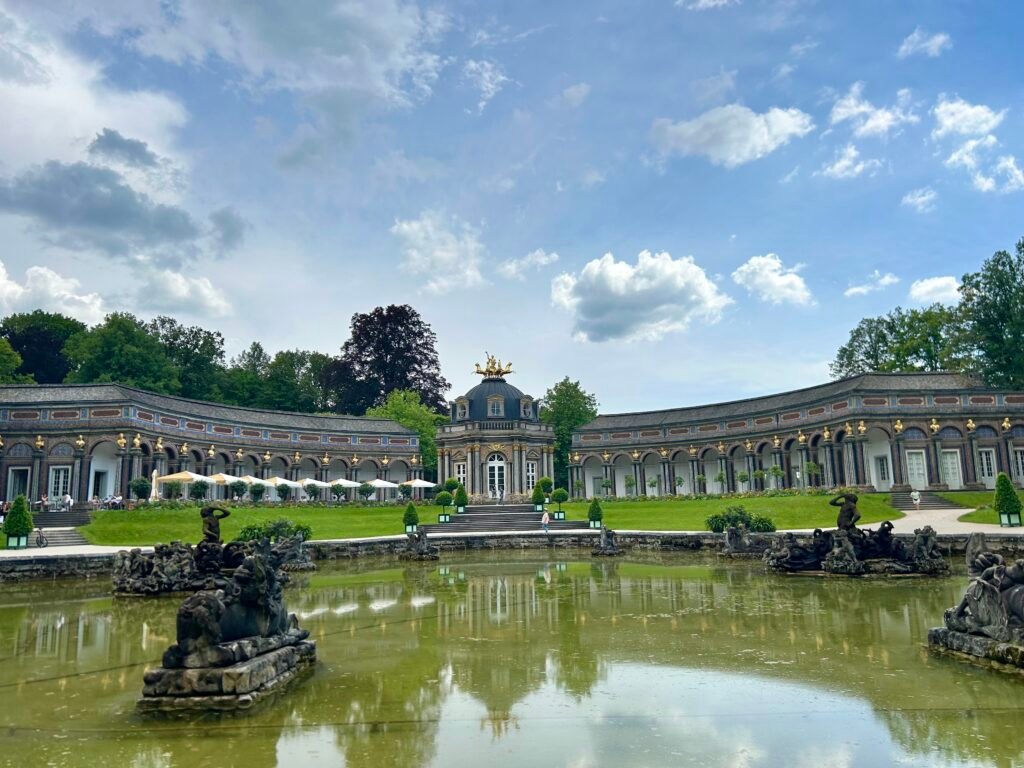
I’ll admit, I didn’t expect to love Bayreuth as much as I did – so hopefully I can pass a bit of the love on to you through this little guide to a truly unique place.
Bayreuth is a charming city that blends historical and cultural significance. Known worldwide for its connection to classical music and the composer Richard Wagner, this city truly offers a glimpse into German royal history and artistic heritage.
Without revealing too much – let’s get into it!
Where Is Bayreuth in Germany?
Nestled in the northern Bavarian region of Upper Franconia, Bayruth is about 70 kilometers northeast of Nuremberg, making it easily accessible as part of a broader Bavarian travel itinerary.
How to get to Bayreuth
From Munich: Flixbus goes all day between Munich and Bayreuth. The journey takes 3 hours and cost €15. Book your ticket here
From Frankfurt: Flixbus also serves the route between Frankfurt and Bayreuth. The journey takes 4 hours and cost €14. Book your ticket here
From Bamberg: A 1 hour bus ride is all it takes between Bamberg and Bayreuth. Best of all? Tickets are only €5! Book here
Where to stay in Bayreuth
|
Primary Rating:
4.5
|
Primary Rating:
4.1
|
Primary Rating:
4.0
|
|
€129
|
€84
|
€82
|
Royal Bayreuth Bavaria
Royalty is thoroughly ingrained in Bayreuth, primarily due to the influence of Margravine Wilhelmine of Prussia. Her passion for art and architecture transformed Bayreuth into a cultural hub during the 18th century. Highlights of her royal touch include the Margravial Opera House, the New Palace, and the sprawling Eremitage gardens.
 Bayreuth: English City Walking Tour
Bayreuth: English City Walking Tour
Discover the world of Wilhelmine in English and explore Bayreuth with a local.
Best things to do in Bayreuth, Germany
Most of the best things to do in Bayreuth are of course visiting the highlights of Margravine Wilhelmine of Prussias buildings – and because of this combination tickets are available.
Combination ticket “New Palace + Margravial Opera House: World Heritage & Museum“
€15 regular · €13 reduced
Combination ticket »The World of Wilhelmine«
(Opera House, New Palace, Old Palace Hermitage, Fantaisie Palace, Zwernitz Castle)
€21 regular · €19 reduced
Bavarian Castle ticket:
With a 14-day ticket you can visit over forty of the most beautiful state sights in all of Bavaria. In Bayreuth this includes the New Palace, Margravial Opera House, Hermitage Old Palace, Garden Museum Fantaisie Palace & Zwernitz Castle.
Price: €35
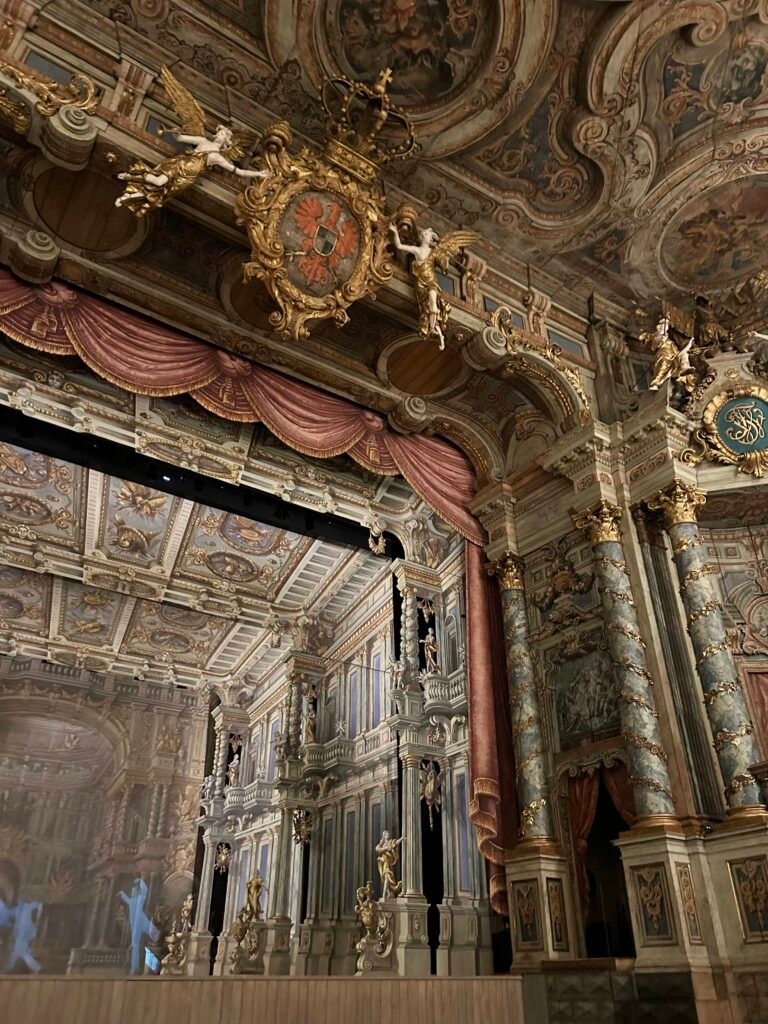
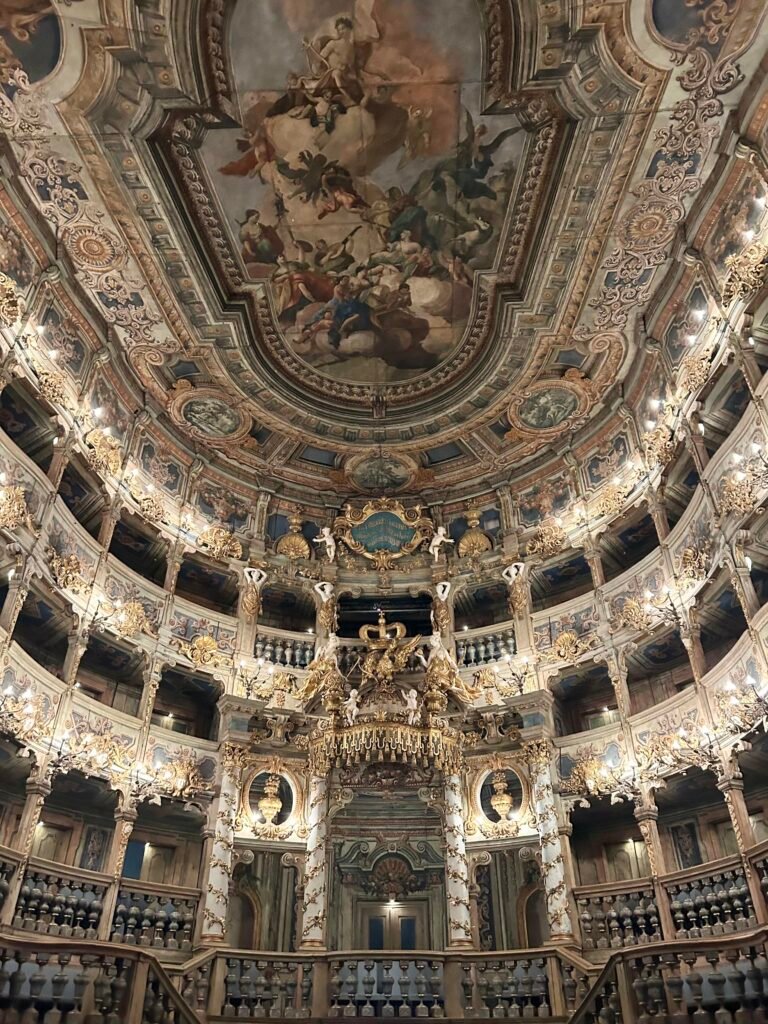
Margravial Opera House (Markgräfliches Opernhaus)
Built in 1748 for the wedding of Margravine Wilhelmine’s daughter, this is not just another European opera house – it’s a perfectly preserved wooden theater and a stunning example of 18th-century baroque theatrical architecture.
Music is played from the stage to give an impression of what attending a play here could feel like. The Opera House also has an exhibition with insights into the theater’s history, architecture, and cultural significance.
Many of Wilhelmine’s personal belongings like diaries and jewellery are displayed here. The exhibition also shows documentation of the extensive restoration work completed between 2012-2018, which returned the theater to its original 18th-century appearance.
Opening hours: daily 10am to 5pm (check the seasonal opening hours here)
Entrance fee: €10
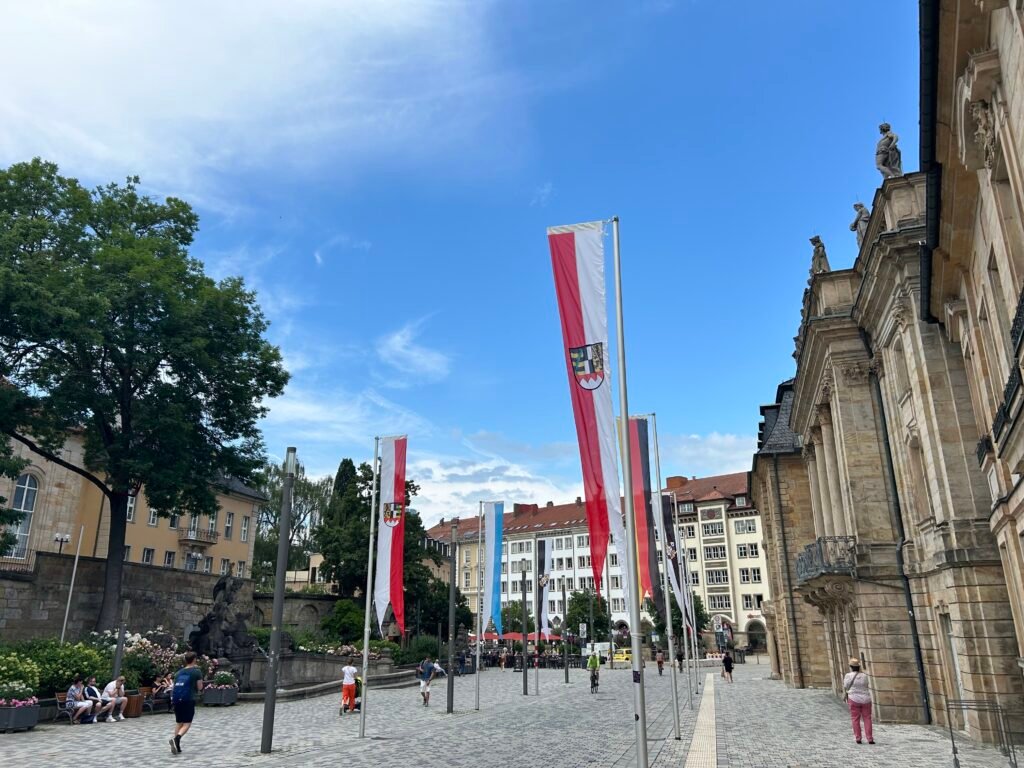
New Palace Bayreuth (Neues Schloss)
Constructed after the Old Castle fire of 1753, the New Palace is an excellent example of Bayreuth Rococo architecture, showing elegant rooms, beautiful gardens, and intricate decorations that reflect the Prussian royal court. This palace was also one of the final major architectural projects overseen by Wilhelmine before her death in 1758.
I was almost alone in the castle when I visited, and felt incredibly immersed in each room. I’m a sucker for old castles, but the New Palace is one of the most authentically preserved I’ve visited.
The New Palace has several notable rooms that you won’t find in any other German castle:
- The Palm Room (Palmenzimmer) – A stunning example of trompe l’oeil painting creating the illusion of an indoor garden paradise with exotic plants and architectural elements
- The Cabinet of Fragmented Mirrors (Spiegelscherbenkabinett) – A unique room decorated with thousands of irregularly cut mirror fragments creating a spectacular kaleidoscopic effect
- The Music Room – Designed specifically for Wilhelmine’s musical performances, showcasing her passion for the arts.
Opening hours: daily 9am to 6pm (closed on Mondays)
Entrance fee: €7
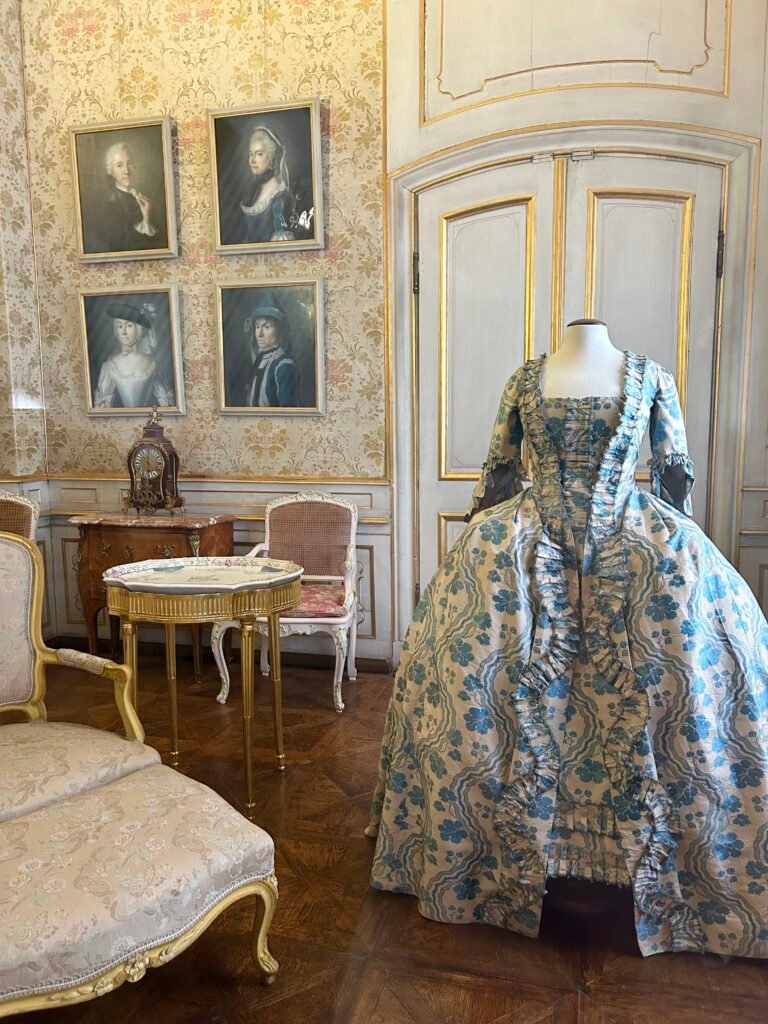
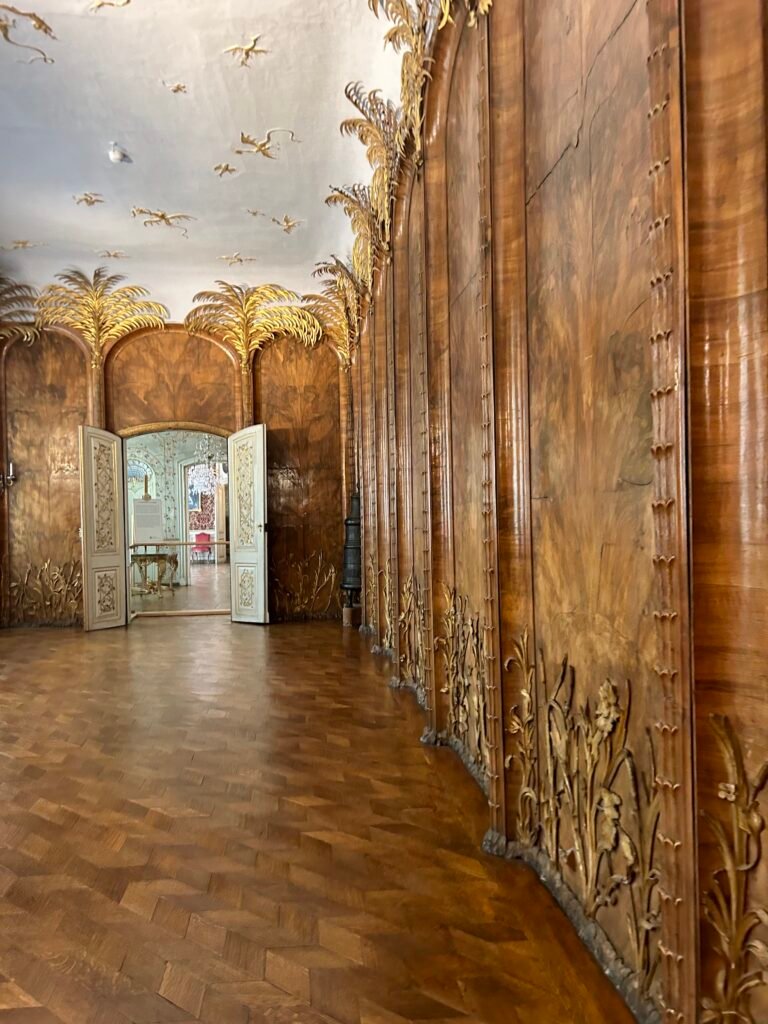
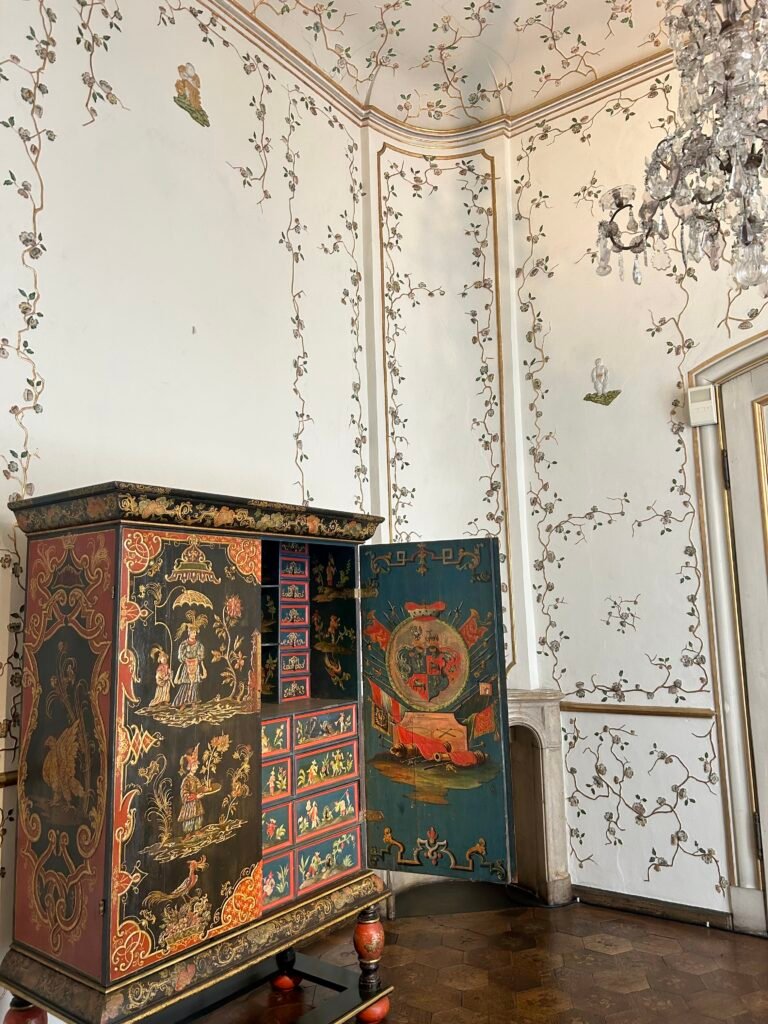
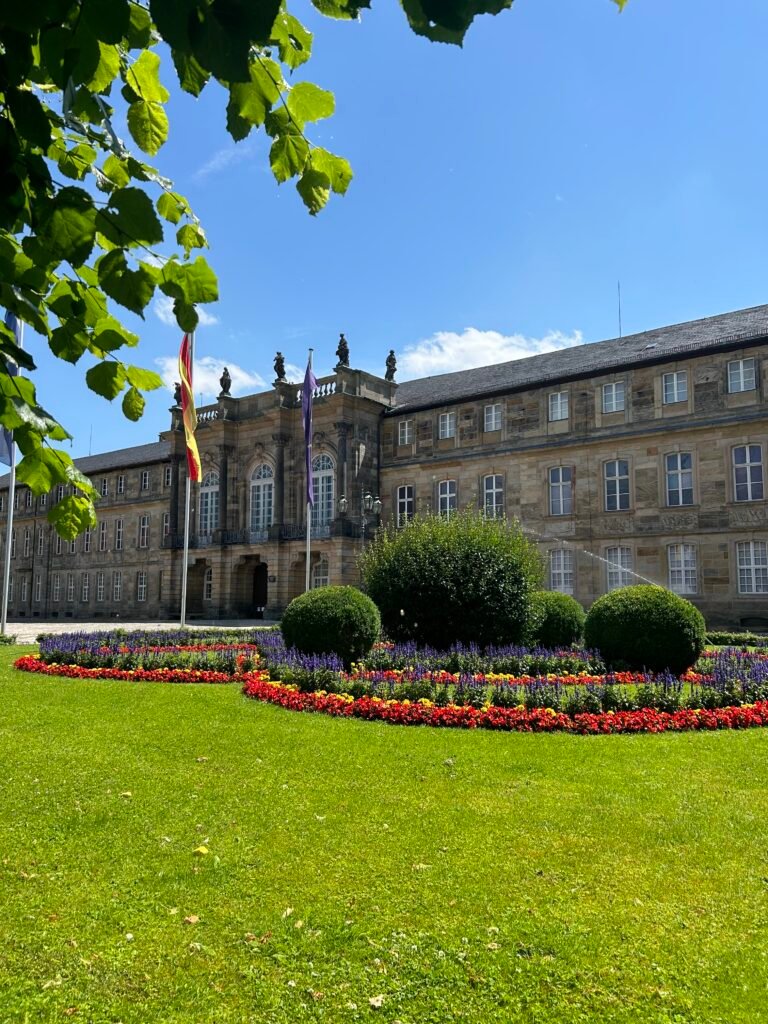
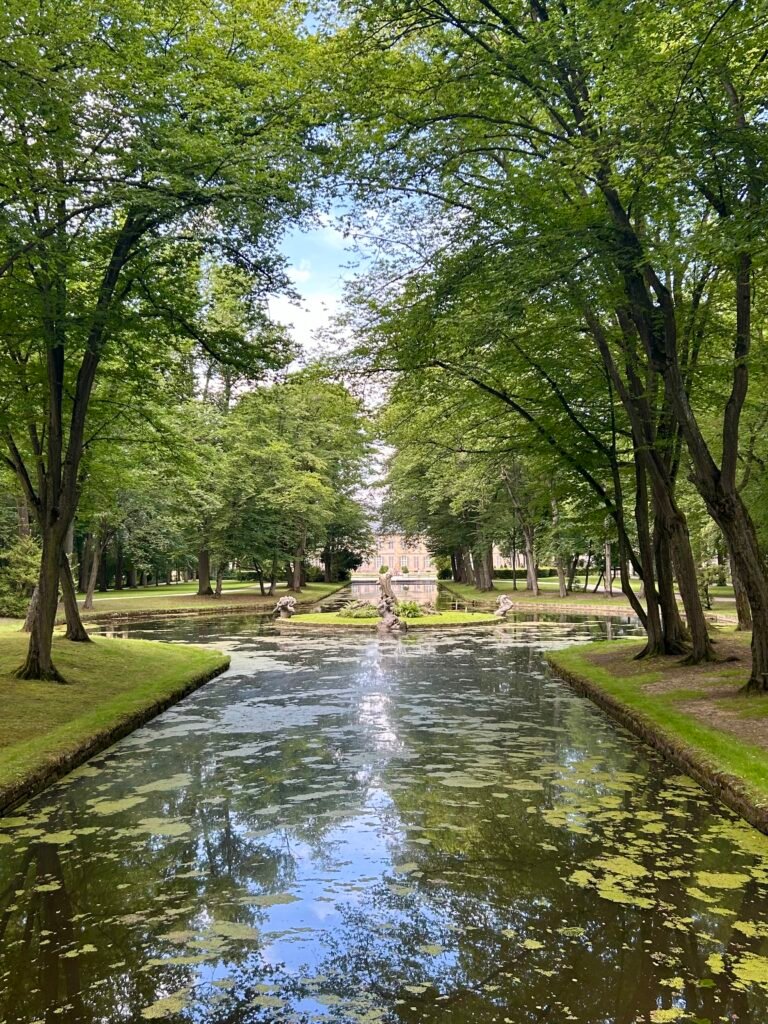
Bayreuth Eremitage
The Eremitage is a unique landscape garden complex featuring an old castle, a cafe and grotto, located about 6 kilometers northeast of Bayreuth’s city center.
You can get here by renting a bicycle (20 min. ride) or bus (20 min. journey). The Bayreuth Eremitage is open 24/7 and is free to enter.
The main sights in the Eremitage are:
Hermitage Old Palace
In 1715 Margrave Georg Wilhelm built the Old Palace near the residential town of Bayreuth as the central feature of a court hermitage. In 1735, when Margrave Friedrich took over the government of the margraviate, Wilhelmine (his wife) instantly fell in love with this unique complex, and began enlarging it.
Opening hours: daily 9am to 6pm (closed on Mondays)
Entrance fee: €6
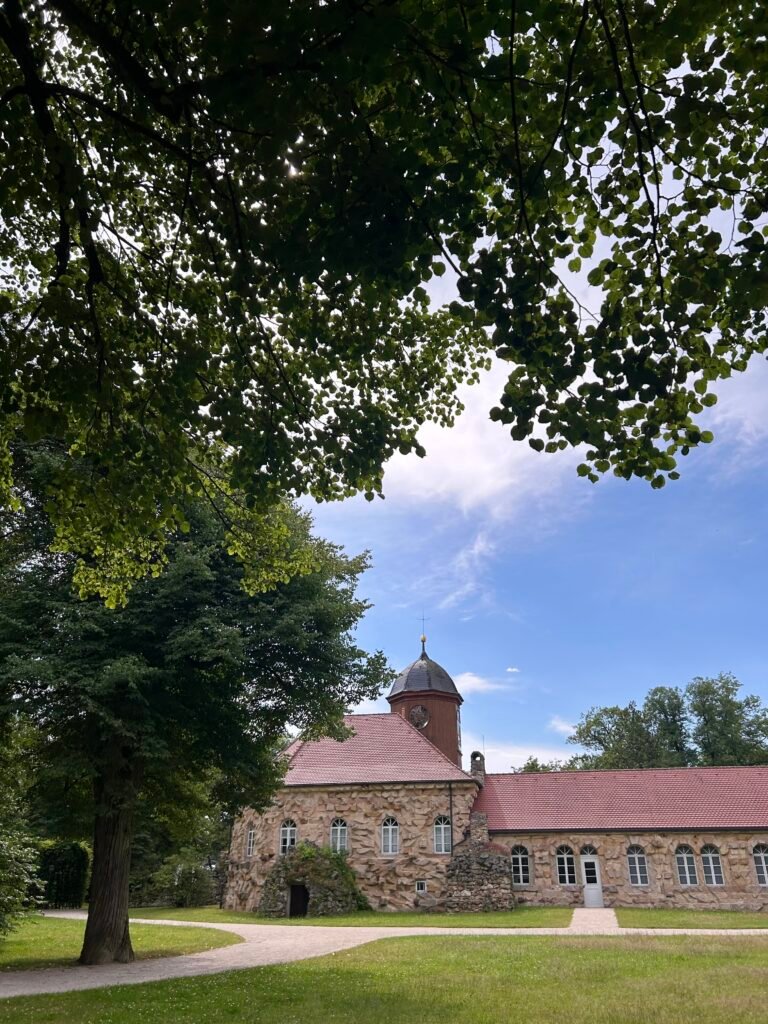
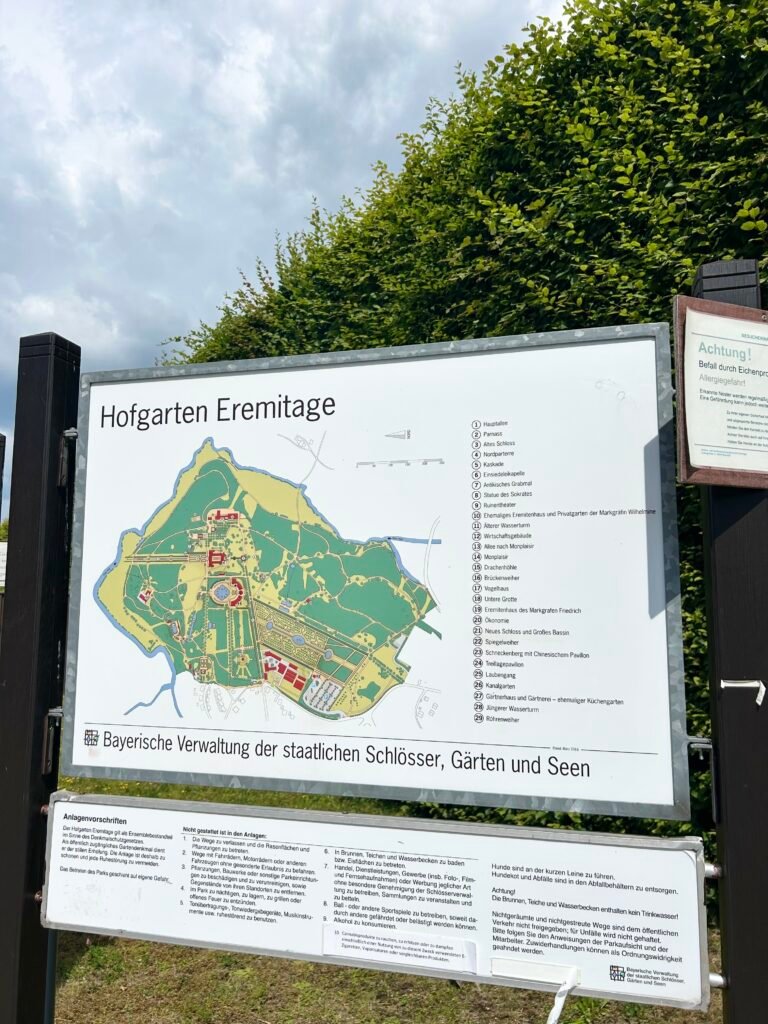
Hermitage New Palace
The New Palace at the Eremitage was commissioned by Margravine Wilhelmine as an extension to the existing Hermitage complex. It was completed in 1753 and serves as additional accommodation and entertaining space for the court when they retreated to the Eremitage during summer months.
One of the most distinctive features of the Eremitage complex and testament to the artistic vision of Margravine Wilhelmine is the Sun Temple. A central circular room (and not an actual temple) with elaborate decorations located as the middle part of the new Palace. It’s called the Sun Temple as the ceiling features a radiant sun design at its center, with golden rays extending outward across the dome. This sun motif gives the room its name and represents Apollo, the god of sun, music, and the arts.
Unfortunately none of the unusual interiors have been preserved due to bomb damage in the Second World War, and today, the New Palace houses event rooms and a Café. The Orangery (Orangerie Schlosscafé) is open during the summer month from 12pm to 5pm daily (closed on Mondays).
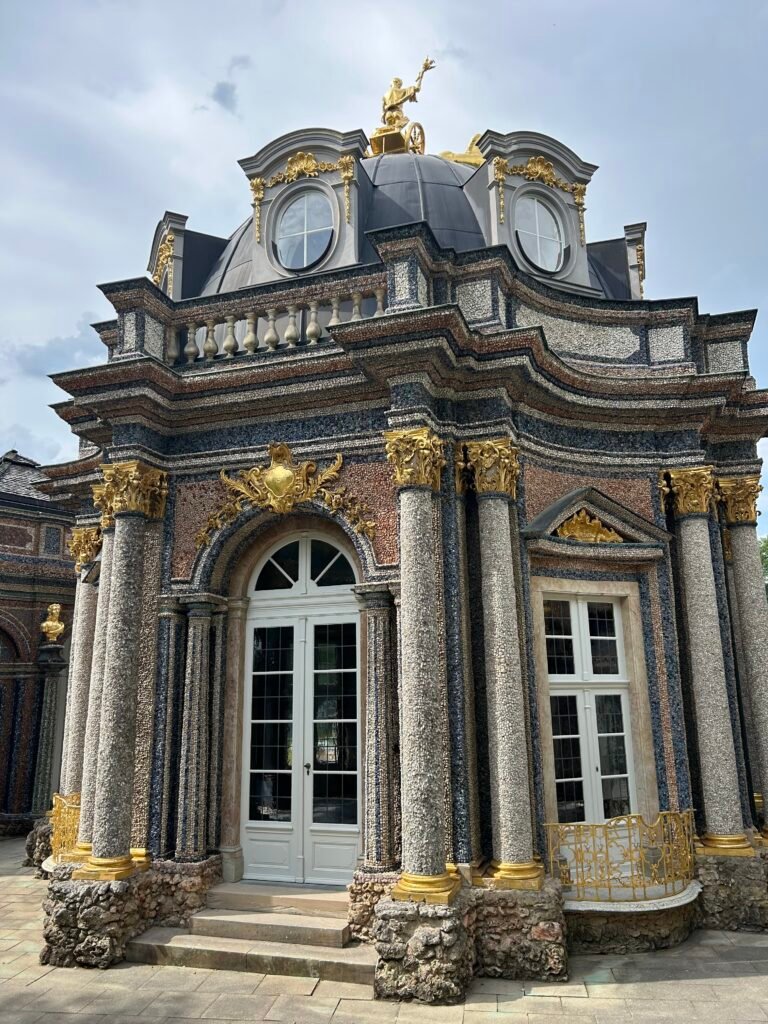
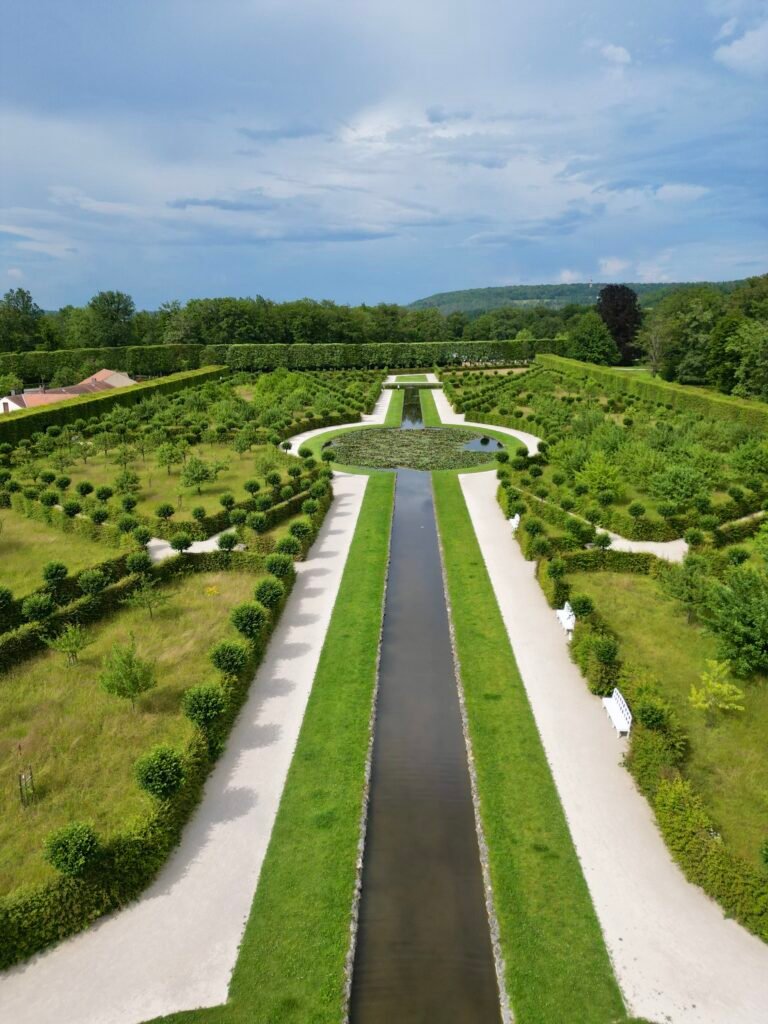
Festspielhaus – Bayreuth Festival Hall
The Bayreuth Festival Hall is considered to be the “mother of all festival halls.” and represents an extraordinary cultural monument dedicated to the works of composer Richard Wagner, who started the construction between 1872 and 1876.
Wagner started a tradition of hosting a festival at the opera house every year, and after his death in 1883, his son Siegfried continued the festival tradition, which still stands today.
The annual Bayreuth Festival (Bayreuther Festspiele in German) is one of the world’s most prestigious cultural events, where tickets are among the most difficult to obtain in the classical music world, with waiting lists often extending for years. The festival is held from late July through August, and is dedicated exclusively to performing Wagner’s operas.
It is possible to visit the Festival Theater on a guided tour.
Guided tours: daily at 11am, 12pm, 2pm and 3pm (see the season offer of tours here)
English guided tour: Saturdays at 1pm
Entrance fee: €10
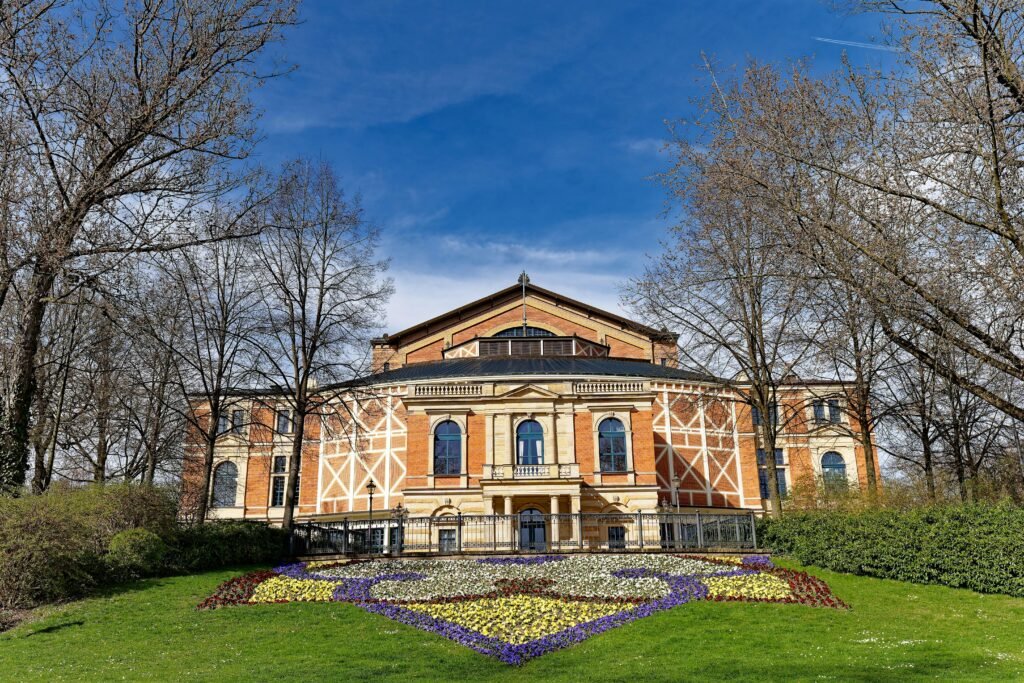
Richard Wagner Museum Bayreuth
This museum offers an immersive journey into the life, work, and legacy of one of music’s most influential and controversial composers. Located in Wagner’s former residence, Villa Wahnfried, the museum gives a comprehensive look at the man behind classical masterpieces. The residence was built between 1872-1874 specifically for Wagner and his family, and financed by King Ludwig II of Bavaria. It’s named “Wahnfried” by Wagner himself (which roughly translates to “peace from madness”). Here you’ll see personal artifacts, interactive displays explaining Wagner’s innovative compositional techniques, documentation of the Bayreuth festival’s founding and its evolution as well as Wagner’s Controversies (he was an anti-Semite and German nationalist).
Opening hours: daily 10am to 5pm (closed on Mondays during winter)
Entrance fee: €10

Hidden gems around Bayreuth
Fantaisie Palace
A charming baroque summer residence constructed in 1761 under the daughter of Margravine Wilhelmine located about 6km from Bayreuth. Though less famous than some of Bayreuth’s other attractions, this elegant palace and its remarkable gardens represent an important piece of the region’s cultural heritage.
The most renowned feature of Fantaisie is its gardens, considered one of Germany’s earliest landscape gardens in the English style. Today the complex houses a Garden Museum, which displays the history and development of garden design across different periods.
Opening hours: daily 9am to 6pm (closed on Mondays)
Entrance fee (palace + garden museum): €4.5
Fantasie Gardens (Schlosspark Fantaisie)
Opening hours: 24/7
Entrance: free
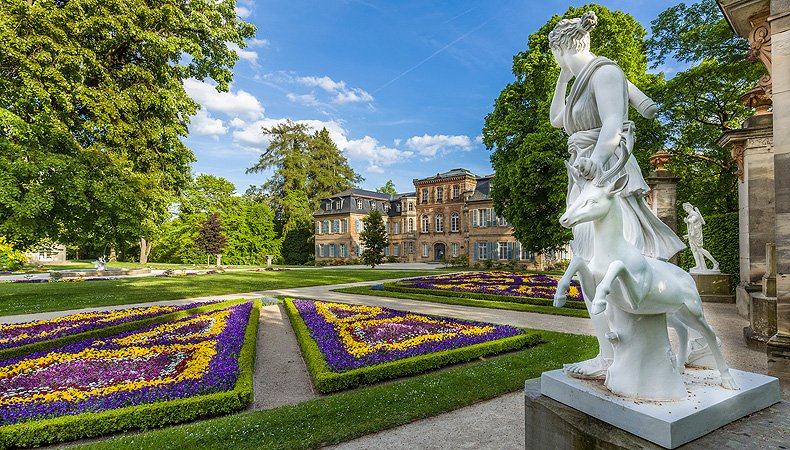
Birken Castle (Schloss Birken)
Even for Bayreuth residents, Birken Castle remains an insider tip: Although this Margravial Palace, located on a small hill between the city center and the university, is several hundred years old, it only opened its doors to the public after the Margravial Opera House in Bayreuth was declared a World Heritage Site in 2012.
In 1686 Margrave Christian Ernst of Brandenburg-Bayreuth donated his hunting lodge Birken to his Oberhofmarschall. Later, during the summer months, the castle is the permanent residence of the Margrave Minister who hosted many festivals take place in the Baroque Hall, where Margrave Wilhelmine and Margrave Friedrich were often guests. Since 1979 Birken Castle has been known nationally as the art auction house P. Rothenbücher KG.
Opening hours: april 1st to mid-October (I can’t find an official timetable)
Entrance fee: €8 (not included in the 14-day castle ticket)

